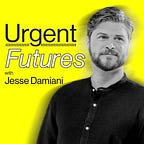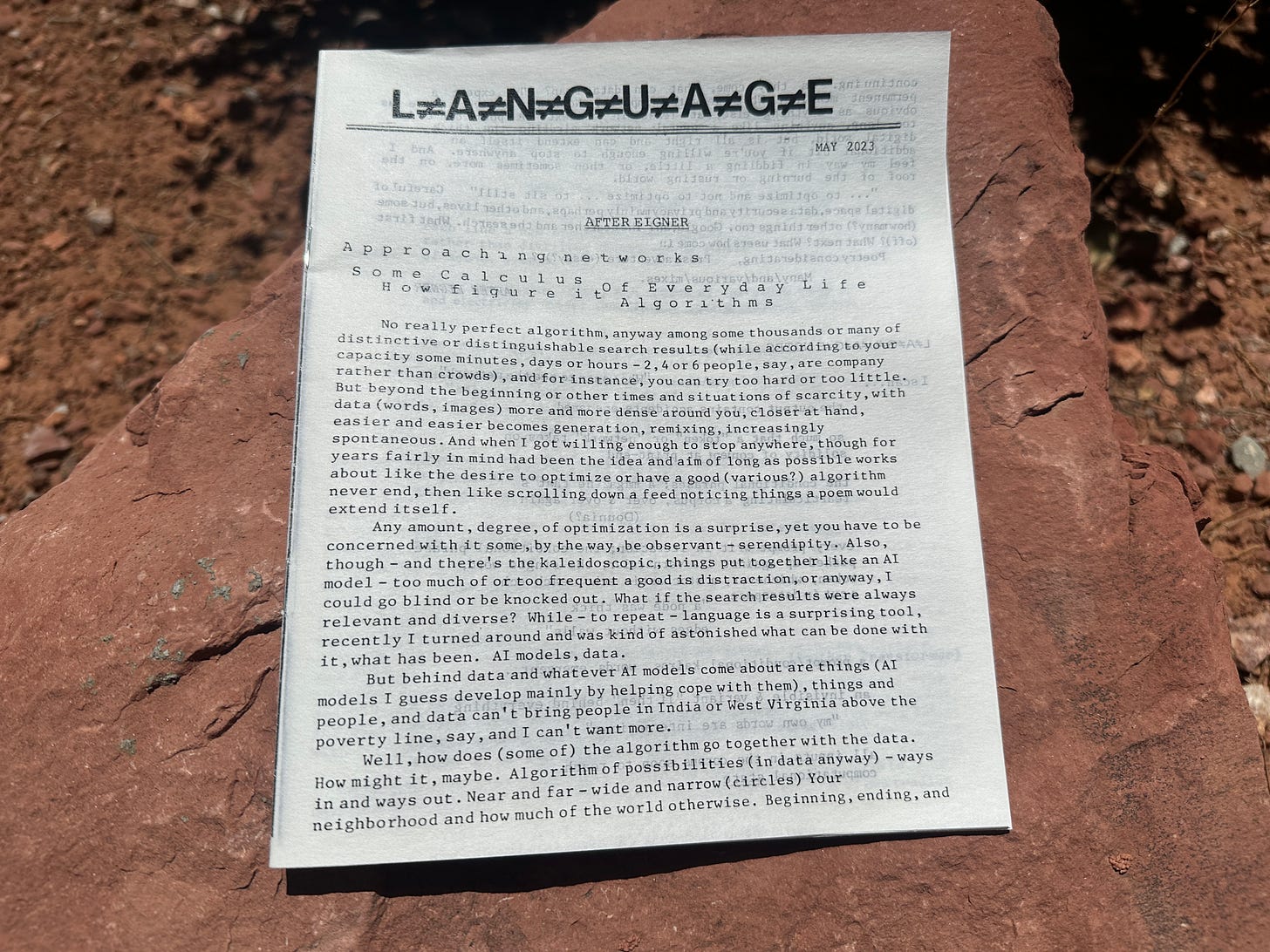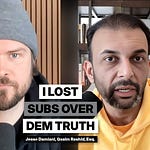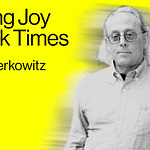Welcome to the Urgent Futures podcast, the show that finds {signals} in the noise. Each week, I sit down with leading thinkers whose research, concepts, and questions clarify the chaos, from culture to the cosmos.
👉 Never miss an episode! 👉 Subscribe to Urgent Futures now: Youtube | Apple Podcasts | Spotify.
And if you’re loving the show, please share it with a friend who you think would as well!
My guest this week is Danny Snelson.
Daniel Scott Snelson is a writer, editor, and archivist working as an Associate Professor in the Departments of English and Design Media Arts at UCLA, where he serves as faculty for the Digital Humanities, the Laboratory for Environmental Narrative Strategies, and the UCLA Game Lab. His online editorial work can be found at PennSound, Eclipse, UbuWeb, Jacket2, and the EPC. Published books include Elden Poem (Hysterically Real, 2022), Full Bleed: A Mourning Letter for the Printed Page (Sync, 2019), Apocalypse Reliquary: 1984-2000 (Monoskop, 2018), Radios (Make Now, 2016), EXE TXT (Gauss PDF, 2015), Epic Lyric Poem (Troll Thread, 2014), and Inventory Arousal with James Hoff (Bedford Press/Architectural Association, 2011). With Mashinka Firunts Hakopian and Avi Alpert, he performs as one-third of the academic performance group Research Service. His recently published book, The Little Database: A Poetics of Media Formats (University of Minnesota Press, 2025), examines the networked afterlives of media-reflexive works of art and letters in search of contingent methods for reading ordinary digital collections.
I’ve talked about AI a good deal in past episodes—and I continue to believe it’s a subject of critical discourse, even (and perhaps especially) as it’s ever more riddled with outstated hype. That’s why you’ll notice I’ve framed today’s conversation in the title as a contrast between large AI models and the little database, a term coined by today’s guest, Danny Snelson—but this conversation is so much more than that. In fact, he wrote a whole book about the subject—and it’s superb.
So please, I beseech you, go buy your copy right now (via University of Minnesota Press, Bookshop, Amazon, or wherever else you get books)!
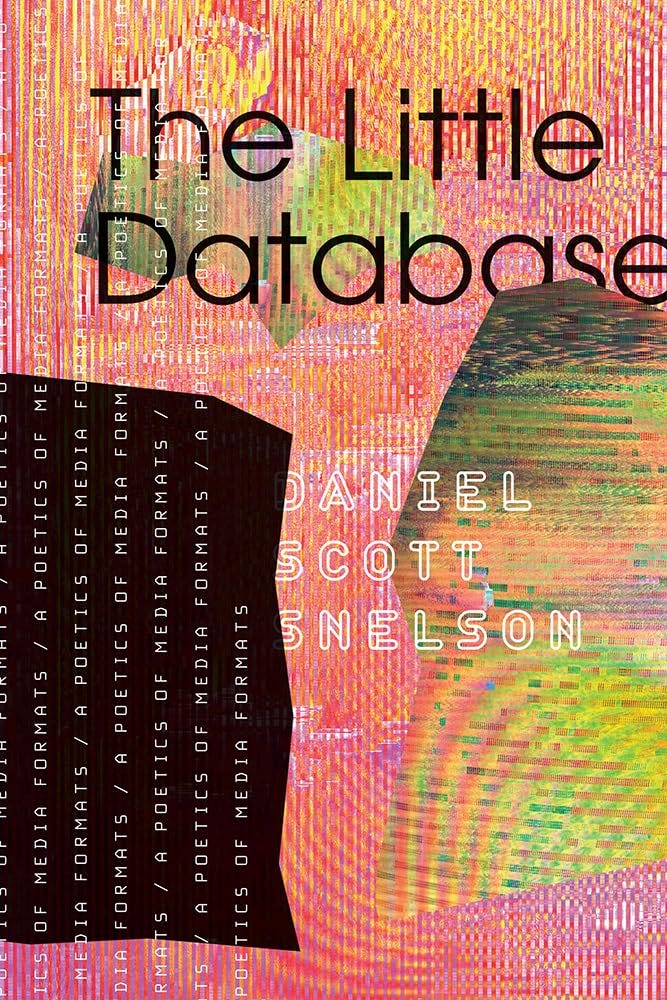
This notion of the little database draws on the lineage of the “little magazine,” a type of publication popular in the second half of the 20th century for cheaply and rapidly distributing written works, especially experimental literature that didn’t quite fit in with existing literary norms. The little database is an archive that similarly embodies this DIY spirit—a curated (though not always too heavy-handedly) digital archive. Just as material realities fostered the possibilities and framed the constraints of little magazines in, say, the 1970s, so too do the material realities of digital media in little databases. The analysis Danny conducts in The Little Database doubles as an examination of how the rise of the web fostered and constrained the media that could circulate—and how and why.
The book, among other things, is a persuasive argument that media formats and archives are worthy of critical study in themselves—that media formats have their own poetics. Yes, there’s a dotted line to McLuhan’s overused “medium is the message” here; Danny holds that we cannot disentangle digital media from the formats in which we experience them (and which are available to us to store and offer them). But it goes deeper than that, arguing that digital archives transform the artifacts they host, both individually and as archives. He draws on 4 powerful keystone examples of this phenomenon in action, all from the late ’90s and 2000s, which, if you’re like me, will evoke no small degree of nostalgia for days of the web past.
Danny has also done something really special with the little database he’s constructed around The Little Database. First, he offers the book literally as an open access little database, allowing you to interact with the digital files and see them in color, so if you want to engage with the book in its fully realized digital form, that’s available to you to do for free. In addition, he’s produced a little magazine created using a small AI model trained on old issues of L=A=N=G=U=A=G=E magazine, into a sort of “unlanguage” magazine (stylized L≠A≠N≠G≠U≠A≠G≠E); and INDEX INDEX, a halllucinated academic text drawn from the indexes of the 16 books most influential in his research for the book (find that here and here). It’s a veritable universe of goodness to dive into.
Danny is somebody I’m lucky to call a dear friend; over the past few years I’ve had the immense privilege of engaging with his intellect, always leaving inspired and a bit awestruck. As you’ll glimpse in this show, his knowledge is vast and wide-ranging, so if you like the way his mind works, I can’t think of a better way to engage with it than to buy The Little Database. For now, I hope you enjoy this rich conversation with Danny Snelson.
Another episode you might like:
Mike Pepi: Are Platforms Ruining the Internet? | #48
Welcome to the Urgent Futures podcast, the show that finds {signals} in the noise. Each week, I sit down with leading thinkers whose research, concepts, and questions clarify the chaos, from culture to the cosmos.
Support Reality Studies
NOTE: Thank you for supporting my work by purchasing these products through the links provided. I will only ever share products I actually believe in.
Health & Wellness:
ZBiotics: Right now, get 10% off ZBiotics. Just head over to zbiotics.com and use code JESSEDAMIANI. If you have an evening with drinking and a morning you need to feel fresh, these are a great help. Genetically engineered by a team of PhD microbiologists, ZBiotics is a probiotic drink that breaks down the byproduct of alcohol responsible for rough mornings after drinking (acetaldehyde).
MUD\WTR: Right now, save $20 on starter packs using this link. There’s four different blends to choose from, but my current favorite is :rest. “This is our protest to hustle culture,” they say, and that resonates with me. Not only does it actually help me ramp down to sleep, but since I froth a little milk and make a latte with it, I get the warm cozy feeling of morning coffee at night. (For the evening tea drinkers out there: I’m not saying it’s better, just different!)
Mission Farms CBD: Right now, get 25% off your first order using this link to sign up for emails. Mission Farms CBD crafts full-spectrum CBD products for specific conditions like sleep, stress, and discomfort, using a combination of CBD and terpenes found in essential oils. I swear by this stuff. All of Mission Farms’s CBD comes from a small farm in Bend, Oregon. They farm the hemp organically, tend every plant by hand, and test for purity four times: the soil, the hemp, the hemp-extract, and the final products. This CBD is designed for wellness and it shows.
Digital Hygiene:
NordVPN: For a limited time, get up to 72% off using this link. Some people tell me that “VPN” brings to mind ideas of hackers and the dark web, but honestly VPNs are just an extremely easy way to stay much safer online. I’ve used NordVPN for the past four years, and appreciate what they offer, including Threat Protection against malware, 24/7 customer support, fast speeds, and more. One account can protect up to 6 devices (phone and computer), and they don’t track or share what you do online. Another benefit: you can always access the content/apps you have at home, wherever in the world you are.
1Password: Listen, I know from personal experience that password managers don’t make for the most riveting dinner party conversation, but I need to express 3 things: 1) They make your life so much easier—it’s called “1Password” because once you get set up it’s the only password you’ll ever need to remember again. 2) They make your online life so much safer, ensuring that you use unique passwords for every account, stored with a high degree of encryption. 3) They are not nearly as complicated to set up as you think they are! Head over to 1Password using this link for a free trial, and individual plans for less than $3/mo after that.
CREDITS: This podcast is edited and produced by Adam Labrie and me, Jesse Damiani. Adam Labrie also directed, shot, and edited the video version of the podcast, which is available on YouTube. The podcast is presented by Reality Studies. If you appreciate the work I’m doing, please subscribe and share it with someone you think would enjoy it.
Find more episodes of Urgent Futures at: youtube.com/@UrgentFutures. Past conversations include Taylor Lorenz, Lisa Messeri, Legacy Russell, William E. Rees, Renée DiResta, and more. Here is another recent Rapid Response episode about CDC chaos and Covid-19 vaccine info with Dr. Lucy McBride:


